Books
Books

From Work to Frame, or, Is There Life After "The Death of the Author"?
"From Work to Frame" was first published in English and Swedish in 1987 in a catalog of the Moderna Museet in Stockholm for the exhibition "Implosion: A Postmodern Perspective" (October 24, 1987 to January 10, 1988).
As S*I*G #12, the text is published in English and in its first German translation, alongside a preface by Hannes Loichinger, who is editor of this issue.
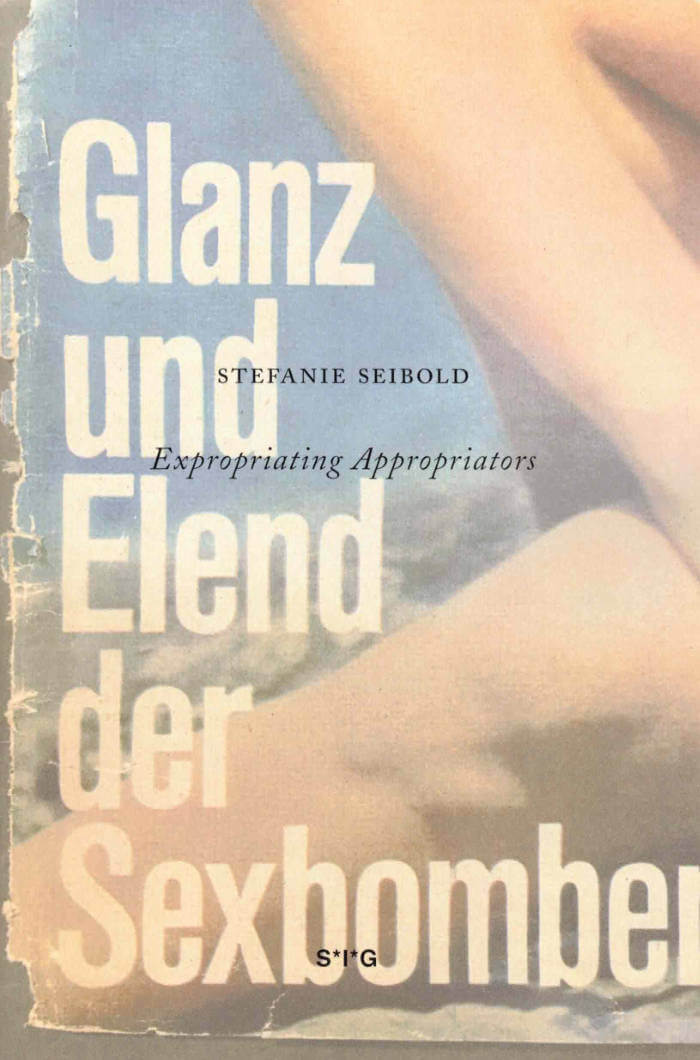
Expropriating Appropriators
An excerpt of images collected over 20 years from popular fashion magazines offers expression to the artist's queer and feminist desires.

Family Picture
An essay in the form of painting studies - including persons, dogs, a frog, a hoofed animal, fish, hare, trees and plants.

Letters from NYC
A diptych of transcribed letters, extracted from two films taking place in 1970s New York, made by Jacques Scandelari and Chantal Akerman.
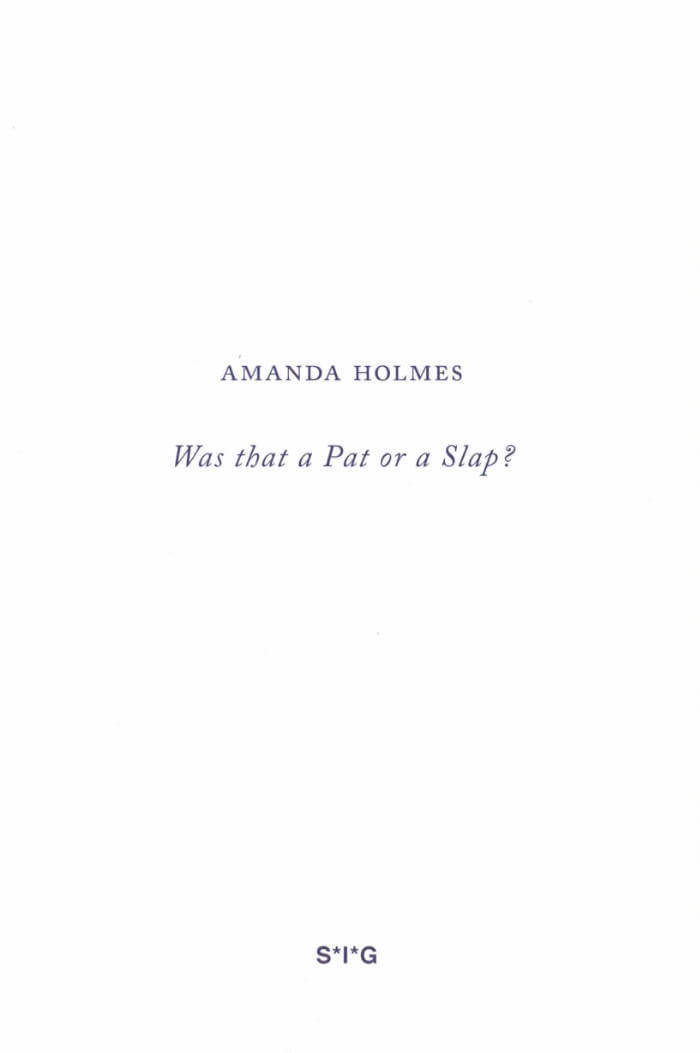
Was that a Pat or a Slap?
Lacan's Critique of Understanding and the Problem of Meaning.


A Nice Well-Behaved Fucked-Up Person
In a single seventeen-page paragraph, Jill Johnston describes an odyssey in and out of a not-yet-described identity in this excerpt from her 1973 bestseller, "Lesbian Nation".

Irrational Man
In this premiere essay, meditations on writing form a mini-antologica. The work of Piera Aulagnier is linked to that of Sade. A focus is cast on the artist Filippo de Pisis. Designed in collaboration with Sara De Bondt. Edited by Megan Francis Sullivan.

Lavskrift
Lavskrift is an edition written using signs collected from script lichen (graphis scripta). The species grows in shady deciduous forest and has small, black structures that resemble writing characters.
In the book Stahle explores asemic writing: writing where the signs have no reference to a known sound or meaning.
Edition: 300 numbered copies
Printed in Sweden by ByWind
Letterpress printed cover
Open spine binding with black thread

Meriem Bennani: Life on the Caps
Meriem Bennani's Life on the CAPS is the final chapter in her film trilogy of the same name. Set in a supernatural, dystopian future surrounding a fictional island in the middle of the Atlantic Ocean, it is rooted in Bennani’s research and reflections on the histories of island societies, biotechnology, and vernacular music. Layering live-action footage and computer-generated animation, Bennani intuitively adapts editing techniques that evoke documentary film, science fiction, phone footage, music videos, and reality TV. Her one-person exhibition at the Renaissance Society marked the debut of this personal, electric yet melancholic consideration of what it is to live in a state of limbo, and this accompanying book captures the film through a combination of still images and selections from a transcript of the film.
This volume includes essays by Emily LaBarge and Elvia Wilk and transcripts of conversations between Meriem Bennani and: Omar Berrada; Fatima Al Quadiri, Negar Azimi, and Tiffany Malakooti; Amal Benzekri; and Aziz Bouyabrine.

CCA Wattis Institute for Contemporary Arts
Cecilia Vicuña: Word Weapons
This book brings together the Palabrarmas series by the artist, poet, and activist Cecilia Vicuña (b. 1948, Santiago, Chile). A neologism that translates to “word weapons” or “word arms,” Palabrarmas imagine new ways of seeing language. By taking the form of collages, silkscreens, drawings, poems, fabric banners, cut-outs, mixed media installations, and street actions, Vicuña brings together many aspects of her practice in poetry, activism, and visual art, allowing new meanings to emerge. This book presents a range of palabrarmas, created over the past four decades, in color for the first time.
Cecilia Vicuña is an artist, poet and activist currently based between New York and Santiago.
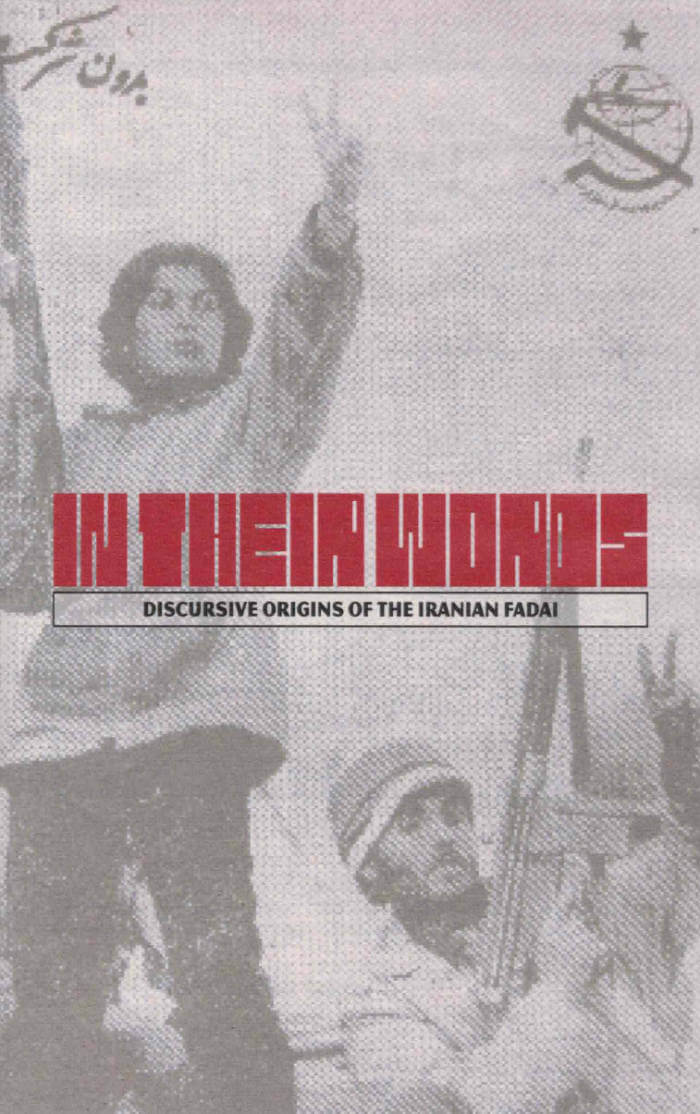
In Their Words: Discursive Origins of the Iranian Fadai
The People’s Fadai (literally, “self-sacrificers”) were a prominent Marxist-Leninist guerrilla organization in Iran. The Fadai emerged in the 1960s from a diffuse movement advocating for armed struggle, in response to the monarchic regime’s increasingly violent crackdowns against all forms of dissent. Many of these original guerrilla groups were dismantled by the secret police, known as the SAVAK, before they had the chance to launch any actual militant actions.
This zine examines a selection of texts influential to or produced by the Fadai. Gradually, their period of study produced original theoretical works that would inform the guerrilla resistance in Iran. Over the course of a decade and a half, these works culminated in the radical newspaper Kar, which is still in publication today. Despite decades of militant leftist publishing and revolutionary movement, Iranian communist thought remains removed from much of the wider Marxist canon.

Zong! (Fifteenth anniversary edition)
A haunting lifeline between archive and memory, law and poetry.
In November 1781, the captain of the slave ship Zong ordered that some 150 Africans be murdered by drowning so that the ship’s owners could collect insurance monies. Relying entirely on the words of the legal decision Gregson v. Gilbert – the only extant public document related to the massacre of those African slaves – Zong! tells the story that cannot be told yet must be told. Equal parts song, moan, shout, oath, ululation, curse, and chant, Zong! excavates the legal text. Memory, history, and law collide and metamorphose into the poetics of the fragment. Through the innovative use of fugal and counterpointed repetition, Zong! becomes an anti-narrative lament that stretches the boundaries of the poetic form, haunting the spaces of forgetting and mourning the forgotten.
Fifteenth anniversary edition, with a new preface by the author and contributions by Katherine McKittrick and Saidiya Hartman.

After Sex
Who decides what happens after sex? The last decade has seen many significant changes to the laws governing women’s reproductive rights around the world, from liberalisation in Ireland to new restrictions in the USA. After Sex offers personal and political perspectives from the mid-20th century to the present day, setting feminist classics alongside contemporary accounts. These essays, short stories and poems trace the debates and tell the stories; together, they ask us to consider what reproductive justice might look like, and how it could reshape sex.
The writers pay special attention to people — both fictional and real — who have sought control over their sexual lives, and the joy, comedy, difficulties and disappointments that entails. But above all, After Sex testifies to the power of great writing to show us why that freedom is worth pursuing — without shame and without apology.
With contributions from:
Lauren Berlant, Joanna Biggs, Edna Bonhomme, Gwendolyn Brooks, Beverley Bryan, Stella Dadzie and Suzanne Scafe, Storm Cecile, Lucille Clifton, Rachel Connolly, T.L. Cowan, ’Jane Does’, Maggie Doherty, Nell Dunn, Andrea Dworkin, Anne Enright, Deborah Friedell, Tracy Fuad, Kristen Ghodsee, Vivian Gornick, Donna Haraway, bell hooks, Barbara Johnson, Jayne Kavanagh, Lisa Hallgarten and Angela Poulter, Jamaica Kincaid, Patricia Knight, R.O. Kwon, Ursula K. Le Guin, Natasha Lennard, Sophie Lewis, Audre Lorde, Amelia Loulli, Erin Maglaque, Holly Pester, Adrienne Rich, Denise Riley, Sally Rooney, Loretta J. Ross, Madeleine Schwartz, SisterSong, Sophie Smith, Annabel Sowemimo, Amia Srinivasan, Keeanga-Yamahtta Taylor, Judith Jarvis Thomson, Alice Walker and Bernard Williams.
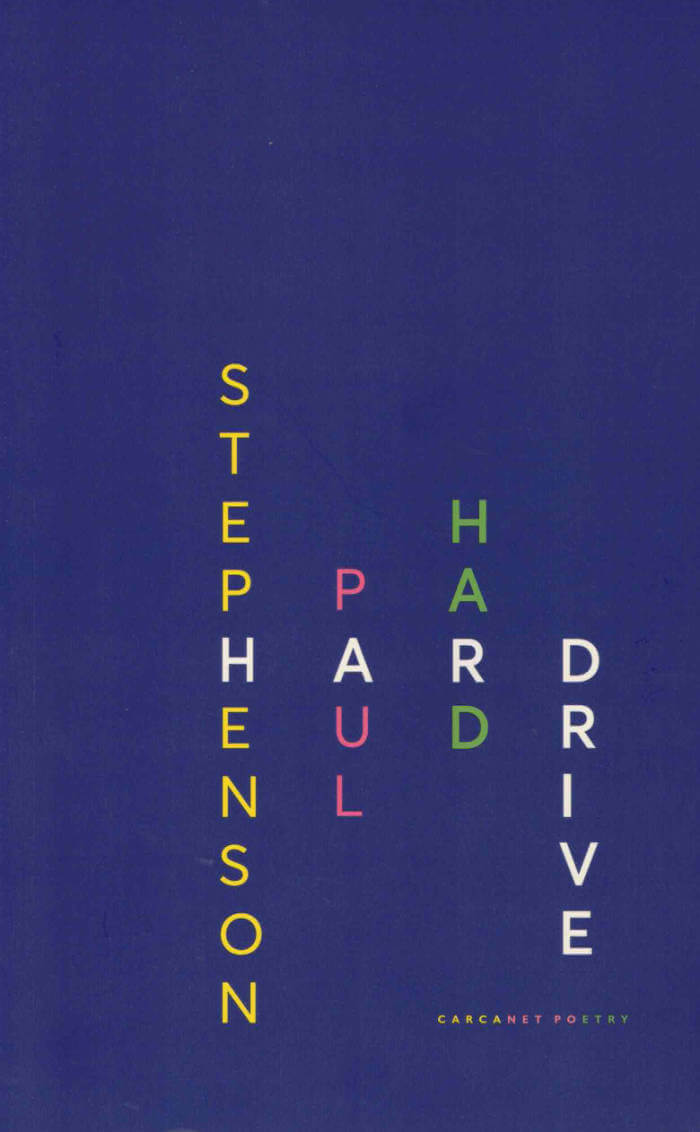
Hard Drive
When his partner suddenly died, life changed utterly for Paul Stephenson. Hard Drive is the outcome of his revisiting a world he thought he knew, but which had been upended. In poems that are affectionate, self-examining, sometimes funny and often surprised by grief in the oddest corners, the poet takes us through rooms, routines, and rituals of bereavement, the memory of love, a shared life and separation. A noted formalist, with a flair for experiment, pattern and the use of constraints, Stephenson has written a remarkable first book, moving and, despite everything, a hopeful record of a gay relationship. It is also a landmark elegy collection.
Paul Stephenson studied modern languages and linguistics. He has published three pamphlets: Those People (Smith/Doorstop, 2015), which won the Poetry Business pamphlet competition; The Days that Followed Paris (HappenStance, 2016), written after the November 2015 terrorist attacks; and Selfie with Waterlilies (Paper Swans Press, 2017). In 2013/14 he took part in the Jerwood/Arvon mentoring scheme and the Aldeburgh Eight, before completing an MA in Creative Writing (Poetry) with the Manchester Writing School. In 2018 he co-edited the ‘Europe’ issue of Magma (70) and currently co-curates Poetry in Aldeburgh. He is a university teacher and researcher, and lives between Cambridge and Brussels.

Margery Kempe
First published in 1994, Robert Glück’s Margery Kempe is one of the most provocative, poignant, and inventive American novels of the last quarter century.
The book tells two stories of romantic obsession. One, based on the first autobiography in English, the medieval Book of Margery Kempe, is about a fifteenth-century woman from East Anglia, a visionary, a troublemaker, a pilgrim to the Holy Land, and an aspiring saint, and her love affair with Jesus. It is complicated. The other is about the author’s own love for an alluring and elusive young American, L. It is complicated. Between these two Margery Kempe, the novel, emerges as an unprecedented exploration of desire, devotion, abjection, and sexual obsession in the form of a novel like no other novel.
Robert Glück’s masterpiece bears comparison with the finest work of such writers as Kathy Acker and Chris Kraus. This edition includes an essay by Glück about the creation of the book titled "My Margery, Margery's Bob."

Motion Sickness
At once dreamlike and tough, hilarious and melancholic, Motion Sickness is a contemporary picaresque in which a young woman drifts and reinvents herself with every new encounter.
For the narrator of Motion Sickness life is an unguided tour, populated with hotels and strangers, art, books, and films. Adrift in Europe, her life becomes a carousel of unusual encounters, where coincidences and luck shape la vita nuova.
In London our narrator is befriended by an expatriate American Buddhist and her mysterious husband. In Paris she meets Arlette, an art historian obsessed with Velazquez’s painting ‘Las Meninas’. In Barcelona she meets two generations of Germans. She tours the hill towns of Italy in a London taxi with two surprising Englishmen in pursuit of art and Henry Moore. She buys postcards to send, but often tears them up, not sure of what the pictures mean.
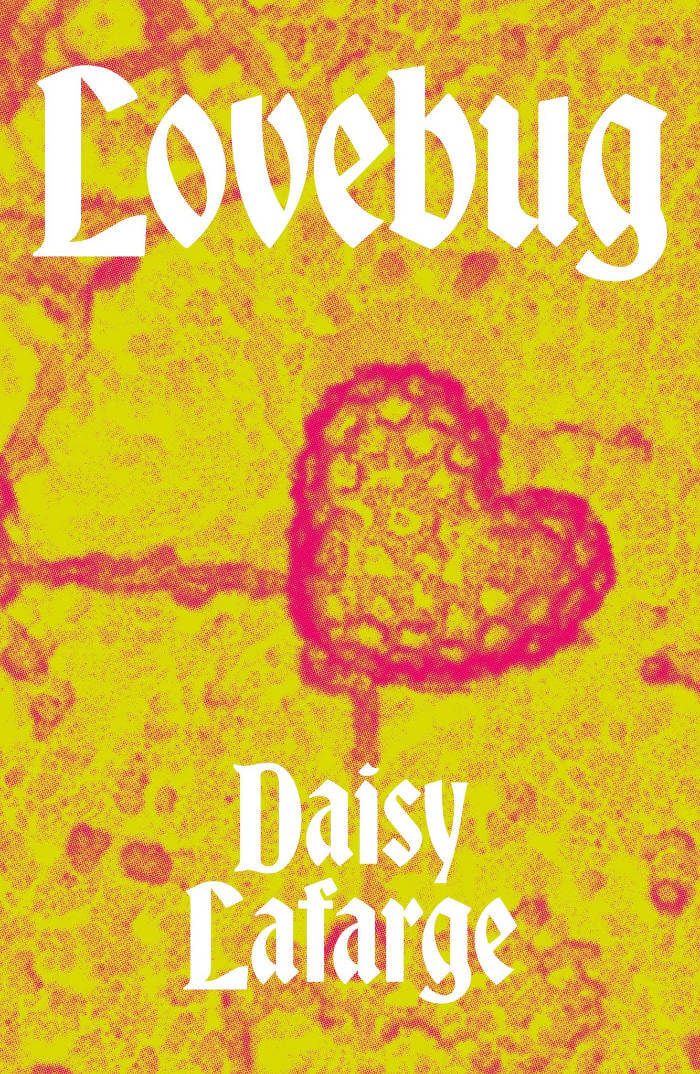
Lovebug
In Lovebug, Daisy Lafarge explores metaphors of love and disease as she seeks to understand human vulnerability and our intimacy with microbial life.
Turning to microbiology, mysticism, and psychoanalysis – as well as the raw materials of love and life – Lafarge navigates the uncomfortable intimacy between the human body and the many bacteria, viruses, and parasites to which it is host.
Lovebug is a book about the poetics of infection, and about how we can learn to live with multispecies ambivalence. How might we forge non-phobic relationships to our ‘little beasts’? How might we rewild our imaginations? In weaving the personal with the pathological, Lovebug complicates the idea of coherent selfhood, revealing life as a site of radical vulnerability and an ongoing negotiation with limit.
"The pathogen arrives anyway and takes a seat at the table. Conditioned to welcome damage, I am curious about this uninvited guest. You must sit down, says Love, and taste my meat".

Border Wisdom
In his second book of poems, Ahmad Almallah seeks a language that captures the afterlives of the mother tongue. This collection blurs the borders between languages, between the living and the dead, between presence and absence.
The poems of Border Wisdom break and mourn physical borders at the same time. Here the exilic idea of a return to a home is expressed in the daily return to the blank page in search of a poem. In these returns the body brushes against the past and, as Hart Crane puts it, taps into "that memory all things nurse."
"In Border Wisdom, Ahmad Almallah takes the notable step of writing in a mix of Arabic and English scripts, a bilingual poetics that has surfaced intermittently among the finest of our experimental writers. For this and for his exemplary writings in standalone English, I would extend to him the well-known welcome that Emerson directed to Whitman nearly two centuries ago: I greet you at the beginning of a great career."—Jerome Rothenberg
Ahmad Almallah grew up in Bethlehem, Palestine and currently lives in Philadelphia where he is an artist-in-residence in Creative Writing at the University of Pennsylvania. His first book of poems, Bitter English, was published in the Phoenix Poets Series from the University of Chicago Press in 2019. He received the 2018 Edith Goldberg Paulson Memorial Prize for Creative Writing, and his sequence of poems “Recourse,” won the 2017 Blanche Colton Williams Fellowship. His poems have appeared in Jacket2, Track//Four, All Roads Will Lead You Home, Apiary, Supplement, SAND, Michigan Quarterly Review, Making Mirrors: Righting/Writing by Refugees, Cordite Poetry Review, Birmingham Poetry Review, American Poetry Review, and Poetry, among others.

nnn4. - no no no celestial journal
published commonly, no no no expounds an experimental poetic offering, both text & art.
each issue features a limited edition artwork. which can be tacked or framed or stored in a drawer.
celestial in nature, no no no takes the form required, and necessary.
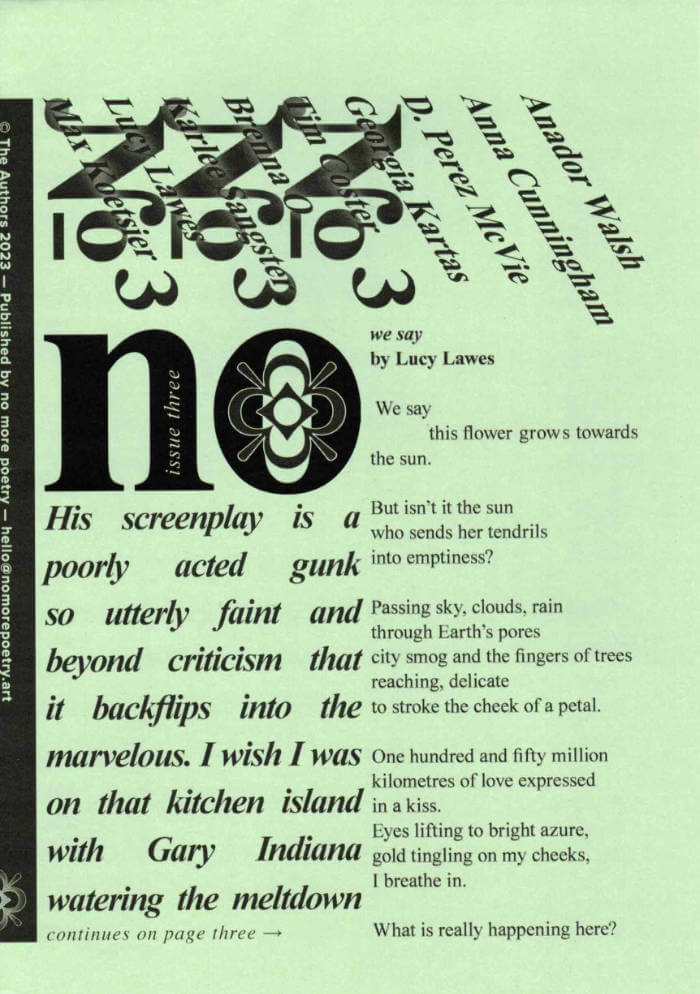
nnn3. - no no no celestial journal
published commonly, no no no expounds an experimental poetic offering, both text & art.
each issue features a limited edition artwork. which can be tacked or framed or stored in a drawer.
celestial in nature, no no no takes the form required, and necessary.

nnn2. - no no no celestial journal
published commonly, no no no expounds an experimental poetic offering, both text & art.
each issue features a limited edition artwork. which can be tacked or framed or stored in a drawer.
celestial in nature, no no no takes the form required, and necessary.
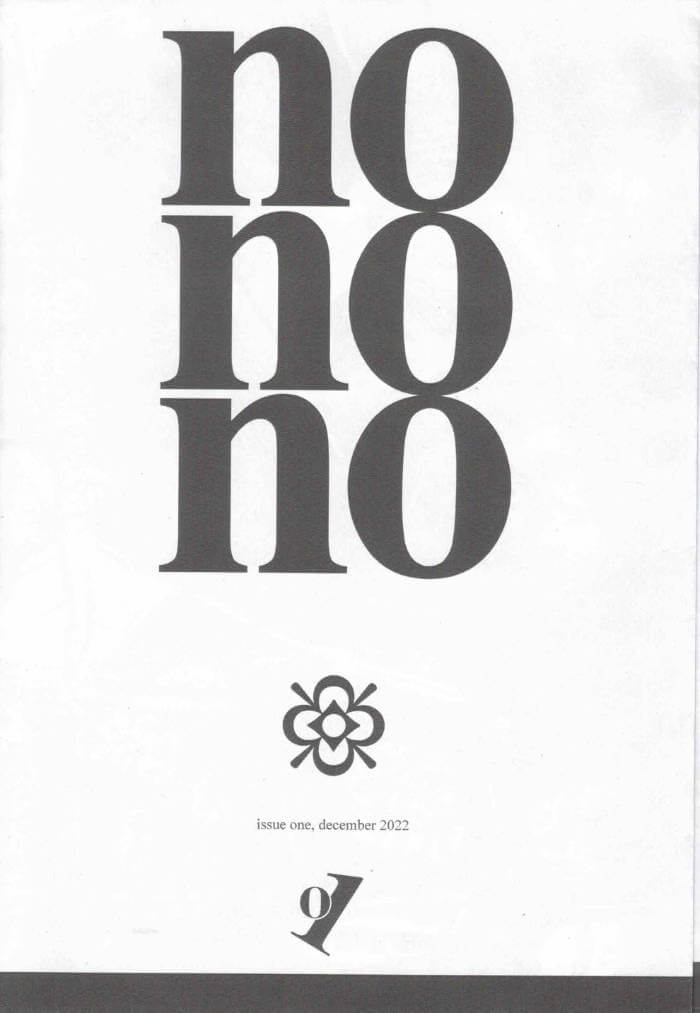
nnn.1 - no no no celestial journal
published commonly, no no no expounds an experimental poetic offering, both text & art.
each issue features a limited edition artwork. which can be tacked or framed or stored in a drawer.
celestial in nature, no no no takes the form required, and necessary.
